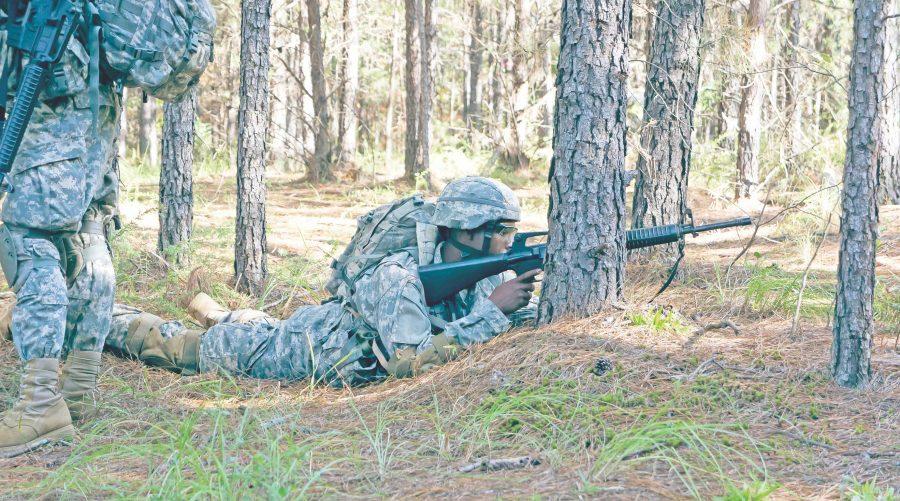Hard-working, driven, team players – phrases like these are often used to describe ideal applicants and employees, and they are qualities that Kelly Fodel, editor of Military Advanced Education magazine, said military veterans usually develop during their service.
“Unfortunately, despite their service to our country and their many skills, unemployment is a huge concern for veterans,” Fodel said. “Education levels the playing field and helps veterans compete for quality jobs.”
To help veterans make informed decisions about their higher education opportunities, Military Advanced Education magazine makes a Guide to Military-Friendly Colleges and Universities. In the newest guide, available on their website, The University of Alabama is designated as a top school.
“This year, institutes were evaluated on their military culture, financial aid for veterans, flexibility, on-campus support and online support services,” Fodel said. “Schools that passed a certain points threshold were designated as our top schools and receive MAE’s Military-Friendly logo to use in promotional materials. However, we don’t rank schools in the guide … Rather, we gather the information, organize it and present it so that the student can make an informed decision.”
Alex Karagas, assistant director of Military and Veteran Affairs, said the University’s programs are designed to reach out to everyone affected by the military, regardless of whether they are receiving or using money through the GI Bill.
“David Blair, who is our director, set the tone when he came in 2011 that we were going to be all-encompassing,” Karagas said. “That really set us apart when it came to our programming and services.”
As a result, services include not only traditional programming, but also reflect aspects of Karagas’ background in student involvement and leadership. She credits the Campus Veterans Association for creating what she calls a hybrid office.
“We really had to rethink the wheel when it comes to that aspect of it, but it’s really been very beneficial for us,” she said.
The UA Office of Veteran and Military Affairs opened in Fall 2012 after a strong push by the Campus Veterans Association and continued backing from the administration, including then-Provost Judy Bonner, whom Karagas called their biggest champion.
All students can be involved in programs like Caring for Camo, which sends letters and gift baskets to actively serving UA students, and Operation Military Kids, which draws attention to military dependents. The office itself offers services from career counseling to financial aid and Veterans Week, which involved 13 programs.
“We really say, ‘From application to graduation,’” Karagas said. “We call ourselves the one-stop shop.”
David Scott, a member of the National Guard and former combat veteran, is working on his Ph.D. He called the University’s infrastructure for military students “outstanding.” The resources and facilities they provide, as well as the arrival of VITAL (Veterans Integration to Academic Leadership), he said, will help the University continue to improve its status as a military-friendly school.
“I think all of these things make The University of Alabama well-positioned in the future and well-deserving of the award,” Scott said.
The next challenge, he said, falls on the student body to unite.
“There is sort of a separation where I don’t think they come to the veteran’s center and understand that’s part of the interface that we as combat veterans have with them,” Scott said. “I call not on the UA administration, but on the general student population to try and make the connection between students and dependent students.”
Whether students are former combat veterans who might have a unique skill set useful to a student organization or military dependents who have developed resilience and stress management techniques, a connection between the populations would be beneficial, Scott said.
“Those strengthening skills, those resiliency skills, we can impart some of them to the general student population. But there’s never a movement to tap them as a resource. There’s never an attempt to make the connection. There’s a whole series of skills that are being more or less missed,” he said. “This doesn’t require a new program on behalf of the University … this requires greater coordination and greater awareness.”
It could be as simple, he said, as inviting veterans to join a co-rec team or checking to see if a veteran might be a licensed option for driving an organization’s bus.
Beyond that, Scott said, veterans have knowledge that is useful not just in combat, but here in Tuscaloosa as well.
“Co-rec sports teams, basic leadership skills, group dynamics, diversity, physical fitness, global knowledge, geography, cultural awareness – these are things that combat veterans have a unique perspective of,” he said. “We want to contribute more than just our GI Bill dollars to this university. We want to contribute to the life and academic vitality of the Capstone.”









